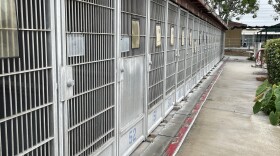The vote on a health care reform bill could turn into a two-for-one deal. Democrats are planning to tack onto the bill an Obama administration plan to reform the federal student loan program.
The administration says the government could save tens of billions of dollars by cutting out banks and lending money directly to students. It's a risky move that could revive — or sink — two of the administration's top priorities.
A Potential 'Twin Victory'?
Removing private lenders from the federal student loan program was never going to be easy. But why is this proposal now part of the up-or-down vote on the health care bill? Even Education Secretary Arne Duncan says he doesn't know.
"But I know this is the right thing to do for our nation's students. It's the right thing to do for taxpayers," Duncan says.
Duncan says bypassing private lenders and having the Education Department lend directly to college students would save at least $67 billion. That's money that could be put back into much more financial aid for needy students and other education programs.
"This is excellent public policy," said Democratic Sen. Tom Harkin of Iowa, speaking to reporters last week. "It's also good politics for Democrats and Republicans alike."
He helped craft the plan to attach the direct lending proposal to the health care bill.
"I also want to add that our bill would reduce the budget deficit — yes, you heard me right. Our bill would reduce the deficit by at least $5 billion," Harkin says.
Harkin called this "sweetening the pot," but that assumes it would attract the votes to pass both health care and major education legislation. Harkin says it would be a "twin victory."
Not Everyone Is In Favor
"I would disagree with Sen. Harkin," says John Dean, special counsel to the Consumer Bankers Association, which has lobbied to persuade Congress to reject direct lending.
Dean says if it passes, private lenders would have to cut 35,000 jobs, the nation's long-term debt would go up and borrowers would have fewer choices.
Attaching direct lending to health care means no Republican is likely to vote for it, and, says Dean, some Democrats may not vote for it either because the proposal would save $20 billion less than what the administration said it would.
"The original bill was too good to be true," Dean says. "Some Democrats are learning that the money is not there for community colleges or early childhood. I suspect some will start to worry about what else is going to be changed in the legislation."
Couldn't Make It On Its Own
Those who have supported direct lending admit that it would not have passed the Senate on its own because the political landscape has deteriorated since last September when it passed the House.
"Also, the economy got worse and more students were going back to school. The demand for Pell Grants skyrocketed," says Rich Williams, who is with the U.S. Public Interest Research Group.
This is why the savings that the Obama administration once touted had to be scaled down, making the whole idea less attractive. Now, says Williams, so much is happening behind closed doors that nobody knows what the direct lending proposal will look like.
But even if the health care bill is shot down and direct lending goes down with it, the Education Department will continue to run at least a modest version of the program.
Copyright 2022 NPR. To see more, visit https://www.npr.org. 9(MDAzMjM2NDYzMDEyMzc1Njk5NjAxNzY3OQ001))





